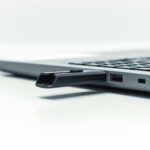
A virus is a type of malware designed to spread from one computer to another. It causes damage to digital data and software. Laptop viruses can harm your computer by deleting files, replicating themselves, and damaging programs, leading to further issues.
Some common symptoms of a laptop virus include a slow-running system, pop-up windows, changes to your home page, and data loss. These viruses can be contracted through everyday activities such as opening spam emails, downloading free games, and sharing music, files, and photos.
It is recommended to use anti-virus software and a firewall, install anti-spyware software, regularly update your operating system, and only download from legitimate sites. You should also be cautious of opening unknown or suspicious messages to protect your laptop from viruses. It is important to stay informed and take the necessary precautions to protect your laptop from viruses.
Resident virus
A resident virus is a type of malware that embeds itself in a laptop’s memory. Depending on its programming, it infects other files run by the laptop. This type of virus is hazardous as it can even attach itself to anti-virus applications, causing them to infect any files that are scanned by the program.
Resident viruses can be classified as fast or slow infectors. Fast infectors can cause rapid damage, but they are easier to identify due to their effects. Slow infectors, on the other hand, spread extensively and can go undiscovered for a long time.
Removing a resident virus can be tricky as it hides and stores itself in the memory. In most cases, a specialised virus removal tool may be required to detach the virus from memory, or a professional may need to perform the task with precision.
It is important to update your anti-virus software regularly. Be cautious when opening suspicious emails and downloading files from the internet to prevent infection by resident viruses.
Multipartite virus
A multipartite virus is a type of malware that infects multiple parts of a system, such as files, memory, and the boot sector. This virus causes significant damage as it can simultaneously affect both the boot sector and program files.
It is highly infectious and easily spreads by inserting code or injecting itself into laptop resources. Not only does it corrupt files, but it can also permanently delete files from the system. As the virus launches multiple times at different times, the entire virus must be extracted from the system to eliminate it.
A laptop infected with a multipartite virus may show symptoms such as:
- Automatic formatting of the hard disk
- Programs and operating systems take a long time to load and boot
- The absence of drive controllers in the device manager
- Modifications of word documents from .docx/doc to .dot
- Continuous changes in application and file sizes
To prevent your laptop from being attacked by viruses, it is important to install a trusted and authorised anti-malware program, back up important files regularly, avoid clicking on suspicious links and websites and update the virus scanner frequently. Also, it is important to practice safe browsing habits and be cautious when downloading files from the internet.
Browser Hijacker
A browser hijacker is a malicious software that modifies a web browser’s settings without the user’s consent and inserts unwanted advertising into the user’s browser. It also redirects the existing page to a website the user hasn’t intended to visit in order to generate fraudulent advertising revenue for its website.
A browser hijacker may also contain spyware to gather the user’s information, such as banking and email-related details. The effects of a hijacked browser can include multiple pop-up advertisement alerts, multiple toolbars on a web browser that the user did not install, and searches being redirected to different websites.
Using a program such as an anti-virus software is recommended to remove spyware. Users can scan and remove unwanted toolbars, and automated tools can automatically delete browser-hijacker-associated files and modifications.
It is important to be aware of browser hijacking and to take necessary action to prevent it. This includes keeping your browser and operating system updated, being cautious when downloading files from the internet, and using anti-virus software to scan and remove unwanted toolbars.
Boot sector virus
A boot sector virus is a type of malware that affects a laptop mostly through physical media such as infected floppy disks or USB drives. It is a hazardous type of malware that can infect not only the boot sector but also corrupt the Master Boot Record (MBR), resulting in the dysfunction of the entire system.
During startup or before opening software, the virus executes malicious code. Once it infects the laptop, the boot sector virus will begin to infect non-infected drives in the system.
An infected laptop may display a blue screen, or the operating system may not start. The user may also notice text on a black screen with an error message indicating that the boot device cannot be found, which is caused by the virus deleting or modifying necessary boot files.
Using good anti-malware software that can scan the boot sector and remove malicious files is recommended. In case the virus can’t be removed due to extensive damage to the functioning code, the hard drive or floppy disk may need to be formatted to destroy the infection.
Be cautious when using external storage devices, and keep your anti-virus software updated to protect your system from boot sector viruses.
Conclusion
By staying informed and following recommended prevention tips, such as using anti-virus software and being cautious when opening emails or downloading files, you can help ensure the security of your device. Remember to be vigilant and take proactive steps to protect yourself from digital risks. If you are facing laptop repair or virus issues and cannot solve them on your own, contact Fixsmart, we are great at it.



